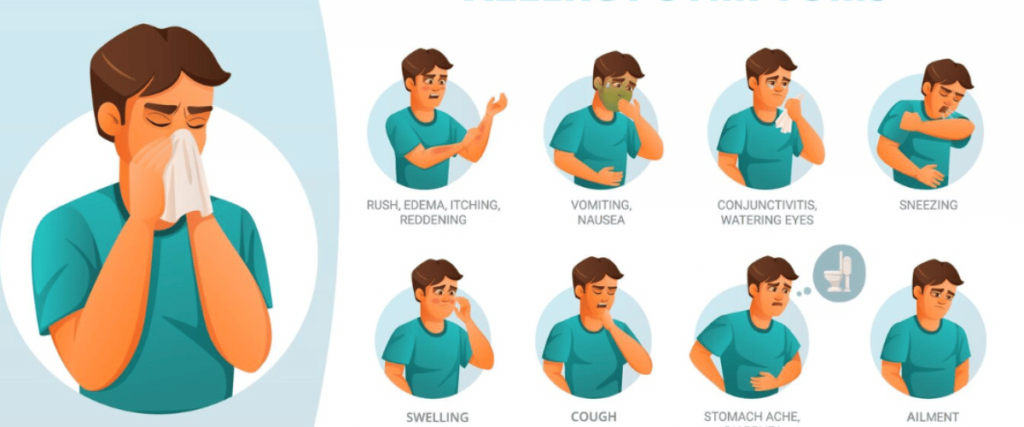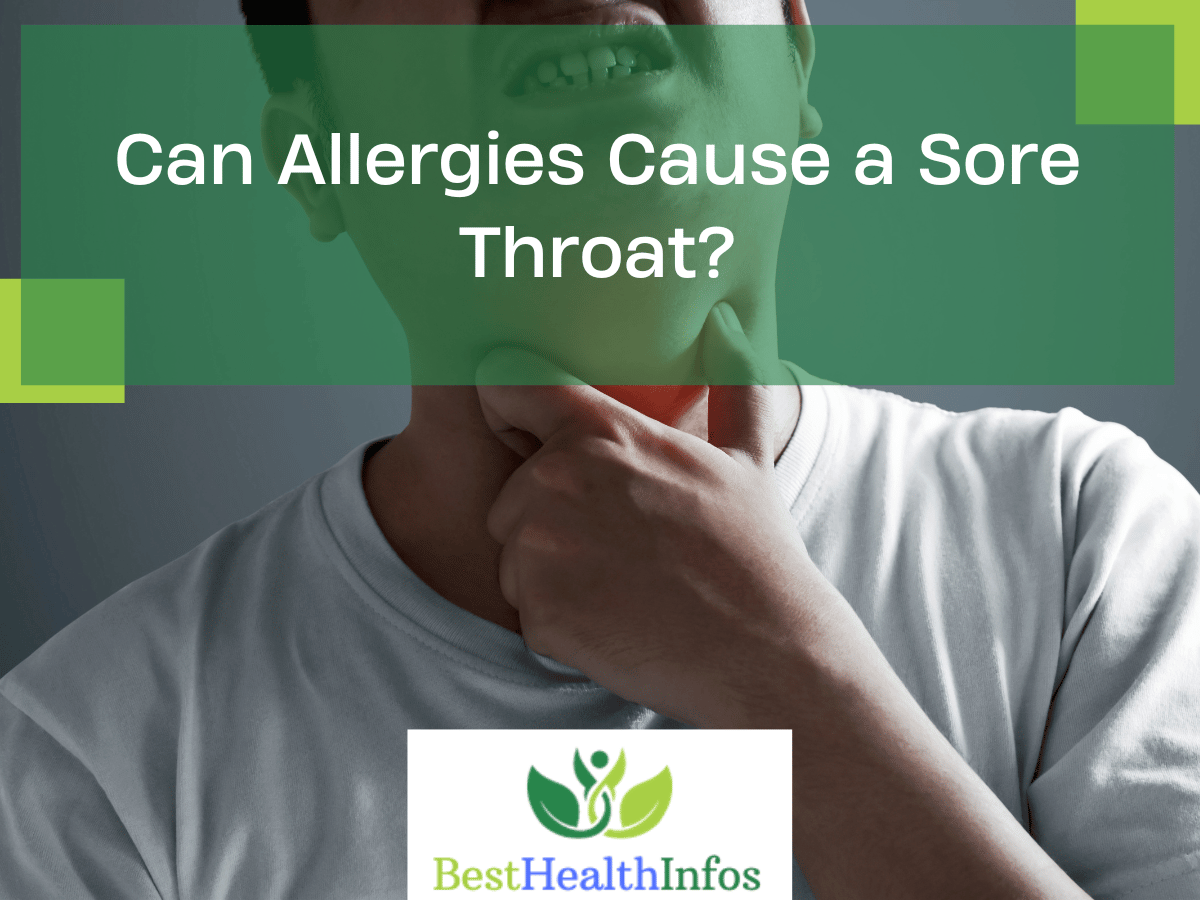A major worldwide health issue that affects millions of individuals is allergies. These hypersensitive reactions happen when the immune system perceives a chemical that is usually harmless as a danger, setting off a series of actions intended to eradicate the purported intruder. Sore throat is one of the overlooked secondary effect of immune responds, and it is associated to many diseases.
However, sore throats are very common conditions and can be attributable to many issues including allergies, bacterial infections and irritants. In this study, we examine the intricate relationship between allergies and sore throats, illuminating the mechanisms that bind these two seemingly unconnected issues.
Kinds of Allergies
Allergies come in various forms with distinct causes and manifestation. Respiratory health is greatly compromised by common allergies to environmental factors including molds, dust mites, and pollens. Food allergies, resulting from negative reaction of a body to certain dietary proteins can also be counted as one of the forms of this spectrum. And pet allergies, that can originate from pet dander, containing specific proteins is the second form of this spectrum.
These allergens then trigger the immune system, which in turn releases histamines and other molecules causing the symptoms like congestion, sneezing and itching. While the respiratory system is the main target of these responses, the throat serves as a secondary battleground for certain individuals.
| Type of Allergy | Triggering Allergens | Common Symptoms |
| Environmental Allergies | Pollen, Dust Mites, Mold | Sneezing, Nasal Congestion, Throat Irritation |
| Food Allergies | Proteins in Certain Foods | Swelling, Itching, Digestive Issues |
| Pet Allergies | Proteins in Pet Dander | Sneezing, Runny Nose, Throat Irritation |
Identifying Allergy-Related Symptoms
Allergies can manifest in various ways, and symptoms can vary depending on the type of allergen and the individual’s response. Here are common allergy-related symptoms:
Respiratory Symptoms:
Sneezing: Frequent or sudden sneezing can be a sign of allergies.
Runny or Stuffy Nose: Allergies often cause nasal congestion or a runny nose.
Itchy or Watery Eyes: Irritation and itching in the eyes are common allergy symptoms.
Coughing: Persistent coughing, especially without other cold symptoms, may be allergy-related.
Skin Symptoms:
Itchy Skin: Allergies can cause generalized itching or localized itching in specific areas.
Rash: Allergic reactions may lead to hives or a red, raised rash.
Eczema: Some allergies can trigger or worsen eczema in susceptible individuals.
Gastrointestinal Symptoms:
Nausea and Vomiting: In some cases, exposure to allergens can cause nausea or vomiting.
Diarrhea or Abdominal Pain: Allergies may affect the digestive system, leading to symptoms like diarrhea or abdominal discomfort.
Ear Symptoms:
Ear Congestion: Allergies can cause a feeling of fullness or congestion in the ears.
Itchy Ears: Irritation or itching in the ears may be allergy-related.
Headache:
Allergy-induced headaches: Sinus congestion and pressure can lead to headaches in some individuals.
Fatigue:
Allergy-related fatigue: Constant exposure to allergens can cause fatigue and a general feeling of being unwell.
Throat Symptoms:
Sore Throat: Postnasal drip from allergies can lead to a persistent sore throat.
Hoarseness: Irritation from allergies may affect the vocal cords.

Anaphylaxis, a severe allergic reaction
Anaphylaxis is a serious and rapid-onset allergic reaction that can affect various parts of the body. It occurs when the immune system overreacts to an allergen, releasing chemicals that cause a range of symptoms. This reaction is swift and can escalate within minutes, posing a significant risk if not treated promptly.
Here are some key features of anaphylaxis:
Symptoms can be diverse: Anaphylaxis can affect the skin (hives, swelling), respiratory system (shortness of breath, wheezing), cardiovascular system (drop in blood pressure, rapid or weak pulse), gastrointestinal system (nausea, vomiting), and more. The combination of symptoms can vary from person to person.
Rapid onset: Unlike less severe allergic reactions, anaphylaxis usually develops quickly after exposure to an allergen. It can progress within minutes, making swift recognition and intervention crucial.
Common triggers: Common triggers include certain foods (peanuts, tree nuts, shellfish), insect stings, medications, and latex. For some individuals, even a trace amount of the allergen can trigger a severe reaction.
Emergency situation: Anaphylaxis is a medical emergency. If you suspect someone is experiencing anaphylaxis, seek immediate medical attention. Administering epinephrine (if available) is a key part of the emergency response.
The Allergy and Respiratory System
The respiratory system is most affected by allergies, and here is where the symptoms most often manifest. Sneezing fits, throat inflammation, and nasal congestion are frequent indicators that the immune system is on high alert. Because the throat and nasal passageways are related, inflammation in one place may quickly travel to the other.
The body mounts an immunological reaction to allergens because it views them as dangers when breathed. When it comes to airborne allergens like pollen, the respiratory system goes into defense mode. The immune system’s attempt to neutralize the perceived threat may result in inflammation or irritation of the throat, which is a necessary part of this system.
Painful Throat with Postnasal Drip
Postnasal drip is a major factor in the relationship between allergies and sore throats. This happens when the back of the throat becomes overabundant with mucus that is generated in reaction to allergies. A constant scratchy or uncomfortable sensation in the throat might result from mucus constantly trickling down it.
In addition to being an allergy symptom, postnasal drip plays a major role in the onset of sore throats. Mucus builds up in the throat, creating the perfect habitat for germs to proliferate and can cause secondary infections that worsen sore throats.
A painful throat and allergic rhinitis
Hay fever, sometimes referred to as allergic rhinitis, is a common allergic reaction that affects the throat and nasal passages. Seasonal variations are often accompanied by this illness, with times of high pollen activity exacerbating symptoms. The symptoms of sore throat, which include runny nose, sneezing, and nasal congestion, might worsen due to allergic rhinitis.
Rhinitis brought on by allergies causes inflammation of the nose and throat passages. Constant mucus flow sets up an inflammatory response that makes the throat more prone to infection and discomfort. For those who suffer from allergic rhinitis, controlling the illness becomes essential to reducing discomfort in the throat and nose.
| Allergic Rhinitis Symptoms | Impact on Throat |
| Sneezing | Throat Irritation and Soreness |
| Runny Nose | Postnasal Drip, Contributing to Sore Throat |
Food allergies that causes sore throat
Anxiety caused by certain foods might aggravate sore throats. Typical food allergies that might irritate the throat include:
| Food Allergen | Common Symptoms | Throat-related Effects |
|---|---|---|
| Nuts (Peanuts and Tree Nuts) | Itching or swelling – Hives – Difficulty breathing | Throat irritation – Swelling in the throat |
| Shellfish (Shrimp, Crab, Lobster) | Itching or swelling – Abdominal pain – Nausea or vomiting | Throat irritation – Swelling in the throat |
| Milk | Hives or rash – Stomach cramps – Diarrhea | Throat irritation – Sore throat |
| Eggs | Skin reactions (rash) – Digestive problems – Respiratory distress | Throat pain – Swelling in the throat |
| Wheat | Itchy skin or rash – Digestive issues – Respiratory symptoms | Throat irritation – Sore throat |
Remember allergic reactions do not give only a sore throat as symptom. However, in case you suspect you might have a food allergy, visit a healthcare professional for accurate diagnosis and follow up measures.
For the purpose of pinpointing the precise cause, they could advise allergy testing or an elimination diet. If there are symptoms of a severe allergic response (anaphylaxis), such as breathing difficulties or swelling of the face and neck, you may need to get medical help very once.
Control and Preventive
Preventing and treating the related sore throat is mostly dependent on controlling allergies well. Decongestants, nasal corticosteroids, and over-the-counter antihistamines may all help by lowering inflammation and inhibiting the immune system. It’s critical to choose drugs based on each patient’s unique symptoms and, if necessary, seek medical advice.
Apart from pharmaceutical interventions, changes in lifestyle may be very influential in averting allergic responses and the consequent pain in the throat. Reduce the frequency and severity of allergy responses by putting allergen avoidance tactics into practice, such as utilizing air purifiers, keeping your home clean, and avoiding known triggers.
To further reduce allergy exposure, adopt strategies like routinely cleaning linen, using pillow and mattress coverings that are allergen-proof, and closing windows during the busiest pollen seasons. By using allergy testing to identify certain triggers, focused avoidance techniques may be developed, offering a customized strategy to treating allergies and averting bouts of sore throat.
| Approach | Examples |
| Over-the-Counter Medications | Antihistamines, Decongestants, Nasal Corticosteroids |
| Lifestyle Modifications | Allergen Avoidance, Air Purifiers, Clean Living Space |
| Allergen Avoidance Strategies | Regular Bedding Washing, Allergen-Proof Covers, Controlled Environment |
When to Seek Medical Assistance
While many instances of allergies and sore throats may be managed with over-the-counter drugs and lifestyle changes, there are certain circumstances that need medical attention. Seeing a doctor is crucial if symptoms worsen, linger longer, or are accompanied by other concerning symptoms like fever, dyspnea, or a chronic cough.
Prescription drugs or allergy immunotherapy may be necessary in some situations to treat underlying immune system problems that result in chronic allergic responses. Finding and treating the underlying cause of allergies may help provide long-term comfort and lower the chance of recurring bouts of sore throat.
| Signs and Symptoms | Action |
| Persistent or Worsening Symptoms | Consult a Healthcare Professional |
| Additional Concerning Signs | High Fever, Difficulty Breathing, Persistent Coughing |
| Professional Medical Guidance | Prescription Medications, Allergy Immunotherapy |
Conclusion
In summary, the complicated relationship between allergens and sore throats reveals a complex interaction between the respiratory system’s components. Those who are aware of how allergens cause immunological reactions and contribute to sore throats are better equipped to manage their allergies proactively.
A multifaceted strategy that incorporates medication, lifestyle modifications, and expert medical supervision when needed may help people manage the difficulties associated with allergic responses and lessen the effect on their throat health. Ensuring a thorough and efficient strategy to treating allergies and preserving general respiratory health requires being aware of the warning signals of chronic symptoms and knowing when to seek medical assistance.
Frequently asked questions
1- How do I know if my sore throat is from allergies?
To determine if allergies are the cause of your sore throat, take into account the following:
- Seasonal Patterns: Take note if it falls with periods of high pollen count.
- Associated Symptoms: Keep a look out for nasal congestion, itchy eyes, and sneezing.
- Postnasal Drip: Inspect your throat for any mucus seeping down.
- Itchy Throat: If you have a continuous itching sensation in your throat.
- Absence of Fever: Fever is seldom brought on by allergies.
- Symptoms Absent Cold Signs: There are no classic flu or cold symptoms.
- Exposure to Known Allergens: In case you have encountered allergens.
- Persistent or Recurrent: Recurring or chronic symptoms might be an indication of allergies.
It is advised to get confirmation from a medical expert.
2- How do you get rid of a sore throat from allergies?
To relieve an allergy-related sore throat:
- Keep Hydrated: To calm and hydrate the throat, sip plenty of water.
- Gargling with salt water may help relieve pain and decrease inflammation.
- Use humidifiers: The moist air helps ease throat inflammation.
- Over-the-Counter Treatments: Taking throat lozenges or antihistamines might help.
- Keep allergies at Bay: Reduce your exposure to recognized allergies.
- Think about Nasal Irrigation: Cleaning your nose with a saline solution may help.
Seek further advice from a healthcare provider if symptoms continue.
3- How long will allergy sore throat last?
An allergy-related sore throat may last anywhere from a few days to many weeks, but exact durations might vary. Timely therapy combined with efficient management may reduce the length of time. Prolonged symptoms need to be evaluated by a professional.
4- Which medicine is best for throat allergy?
Several over-the-counter drugs may help with throat allergies:
- Antihistamines: By preventing the production of histamine, medications including loratadine (Claritin) and cetirizine (Zyrtec) may help relieve sore throats.
- Decongestants: Similar to pseudoephedrine, these medications help lessen postnasal drip and nasal congestion, which may cause sore throats.
- Throat lozenges or sprays: Sooth and numb the throat to provide localized comfort.
- Nose corticosteroids: Fluticasone (Flonase), for example, may help lessen throat and nose channel irritation.
Before taking any drug, be sure it is appropriate for your particular condition and won’t interfere with other medications you may be taking by speaking with a healthcare provider.
5- What food allergies cause sore throat?
The following common food allergies may result in a sore throat:
- Nuts from trees: walnuts, almonds, etc.
- Peanuts: Not really a nut, but a legume.
- Shellfish: Lobster, crab, shrimp, etc.
- Fish: Tuna and salmon, for example.
- Eggs: Particularly the white’s protein content.
In case of a severe allergic response, it is essential to seek immediate medical assistance.
Resource:



